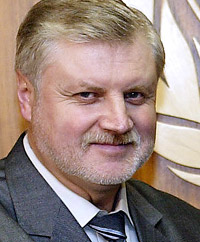A conference was held yesterday at the National Assembly. The title of the conference was “Interregional Russian-Armenian cooperation-situation and outlooks”. President of the National Assembly Arthur Baghdasaryan and president of Federative Council of the Russian Federation Sergey Mironov made their opening speeches.
As expected, there were mainly declarative speeches made about the past, present and future achievements. The signed contracts and the dynamics were presented as the major achievement. S. Mironov emphasized the importance of interregional cooperation and stated that, at the present, there are more than 15 Russian businessmen that have signed more than 20 contracts with Armenian colleagues. Arthur Baghdasaryan’s speech did not differ too much. “Russia has been and always will be the largest economic partner for Armenia,” said the speaker of the National Assembly. He stated that the legal part of the contracts consists of more than 160 interstate and inter supervision documents and claimed that it was important to use those documents.
If someone who is unfamiliar with the events that have been going on recently and he were to listen to this speech, he would get the impression that everything is fine and that the cooperation between the strategic allies is going at a smooth pace. However, the topic about gas casts a shade. It is not by chance that even during the days when the Federative Council was visiting our country’s National Assembly (which used to take place in Kazakhstan before), many of our MPs were not greeting our Russian colleagues with much enthusiasm. Even the members of the coalition were complaining-“They increased the price of gas and now they are putting on a concert.” This last statement referred to the event that took place at the National Assembly the previous day, when the session was interrupted by a concert in the hallway.
S. Mironov emphasized the importance of the Sochi-Sukhumi-Tbilisi-Yerevan railway construction. “It is necessary for us and preliminary work is being done primarily within the framework of Russian-Armenian cooperation. Of course, everything is not going as planned, but I think that the main thing here is the economic interest for both countries and also Georgia. I believe that that project will be implemented sooner or later and the sooner the better,” said Mr. Mironov.
National Assembly vice speaker Vahan Hovhannisyan also discussed the railway project, saying that not having that railway is one of the obstacles facing Armenian-Russian economic ties. “The countries of the region are trying to keep Armenia out of the integration process. Despite the fact that Armenia is a member of the international organizations, those international organizations are not showing us much support,” said V. Hovhannisyan and referred to the CIS countries. We must state that Vahan Hovhannisyan’s speech, which in contrast to others’ speeches was not printed, had a critical character to it; or better yet, it was said in an offended tone. In regard to the increase in gas prices, the National Assembly vice speaker claimed that the increase in prices worries many people. Although many say that that must be looked at from the market relations perspective, however, it is negative and, according to V. Hovhannisyan, must be eliminated.
As to how to eliminate that-at the present, they are not responding; Armenian and Russian authorities are also not explaining. The most frequently heard word combination is “market principles” which simply means that Russia is not planning on giving in to persuasions and proposals and forget about its economic interests-even if that hurts its strategic ally.
Just like Russian Prime Minister Fradkov’s visit to Armenia, Mironov’s also did not bring any news about the increase in gas prices. The president of the Federative Council simply said that the price of gas differs in each CIS country. Whereas Ukrainian citizens pay 160 dollars for 1000 cubic meters, it is possible that Russia and Armenia come to terms and the amount will benefit both sides. We suppose that the presidents of both Russia and Armenia will come to terms and make the final decision. In a word, all we have to do is wait and see whether or not our wish of paying 110 dollars for gas comes true.
It is foreseen to have the National Assembly of Armenia spend some days in Russia next year. Too bad we don’t have any strategic resources to export to Russia, otherwise we could have increased the price of that resource 2 months prior to the events and then go to Moscow with the Armenian dhol and zourna and win the Russians over.

